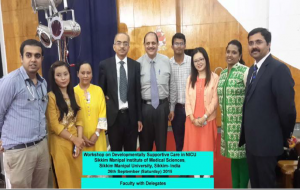 The field of Neonatology (Newborn Medicine) has experienced some remarkable progress over the last four decades in care of the newborn. This has reflected with dramatic reductions in both neonatal and infant mortality and has enabled the neonatal team to save more babies of lower gestational age and extremely low birth weight (ELBW). In the present times, the incidence of prematurity is high in both western and eastern worlds. However, morbidity rate of neurodevelopmental impairment has not decreased for this population. The field of Neonatology (Newborn Medicine) has experienced some remarkable progress over the last four decades in care of the newborn. This has reflected with dramatic reductions in both neonatal and infant mortality and has enabled the neonatal team to save more babies of lower gestational age and extremely low birth weight (ELBW). In the present times, the incidence of prematurity is high in both western and eastern worlds. However, morbidity rate of neurodevelopmental impairment has not decreased for this population.The preterm infant experiences a hostile environment in the intensive care (NICU) setting as compared to the womb, which is challenging to the immature homeostatic mechanisms of a preterm baby. This altered sensory experience can have a negative impact on an infant’s brain development. The in-utero environment of a developing fetus is characterized by generalized extremity flexion and containment, limited light and noise exposure, sleep cycle preservation, and unrestricted access to mother via somatosensory, auditory, and chemosensory pathways. This environment is favorable for positive sensory input which is crucial for normal fetal brain development. It is increasingly clear that newborn babies respond to and are affected by the environment around them. Compared with the womb, even in the best designed modern Neonatal Intensive Care Unit (NICU), a newborn preterm infant is deprived of the basic developmental needs. . This environment is typically characterized by painful procedures, excessive light and noise exposure, interrupted and inadequate sleep, and separation from mother. Negative replaces positive sensory input into the developing fetal brain which, as research shows, can permanently alter normal brain development. It is the duty of all neonatal practitioners to minimize exposure to noxious and painful stimuli and reduce psychological disturbance to the baby during a time of rapid brain development and to support the whole family in adapting to their circumstances in order to promote the best long-term outcome. All units involved with the care of sick infants should also develop strategies to promote the attachment of parents to their sick infants . A good parent – infant attachment has been shown to produce both short term and long-term benefits in terms of physical and neurodevelomental outcomes. Developmentally Supportive Care (DSC) practices are evidence-based interventions that promote newborn brain and neurobehavioral development. They involve a broad category of interventions designed to minimize the stress of the NICU environment and include elements such as control of external stimuli (auditory, visual, tactile, vestibular), clustering of nursing care activities to avoid disrupting sleep, positioning or swaddling of the preterm infant and calming techniques. The goal is to provide a structured care environment which supports, encourages and guides the developmental organization of the premature and/or critically ill infant. As neonatal care providers Our Goal Should Be To Improve Functional Outcome, Have Positive Neuro Developmental Outcome And Achieve The Gold Standard Of “INTACT SURVIVAL” Of The Preterm, Fragile And/Or Critically Ill Infants. |
PARAS HOSPITAL C-1 Sushant Lok- 1, Sector-43, Phase- I, Gurgaon, Haryana 122002 Timings Monday-Saturday : 12:30 pm - 05:00 pm
CHILDREN'S MEDICARE Villa No. 6, Ardee city Gate no. 1, (next to Ardee Mall), Sector 52, Gurugram, Haryana 122003 Timings Monday-Saturday : 5:30 pm - 8:30 pm